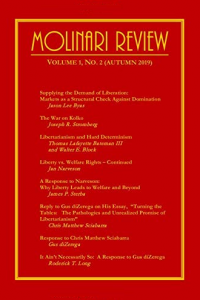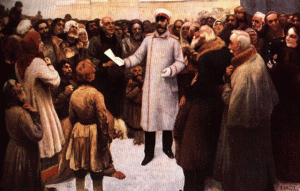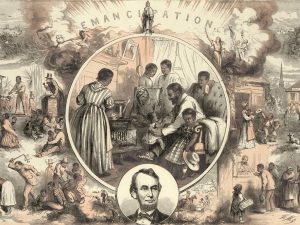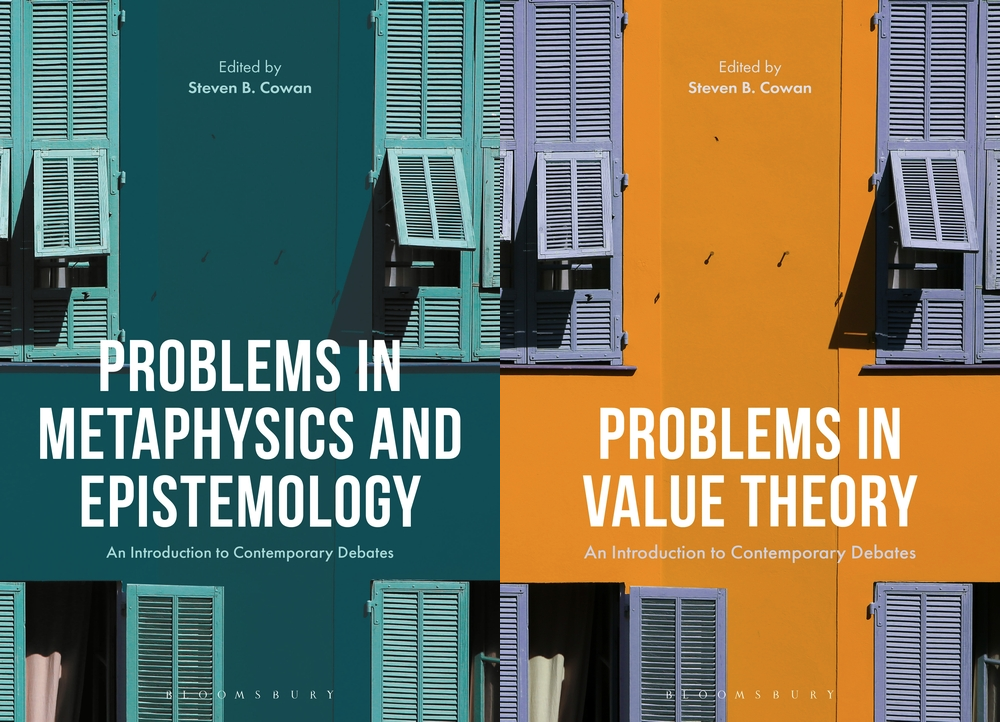[cross-posted at BHL and POT]
Andalusia
with fields full of grain
I have to see you
again and again
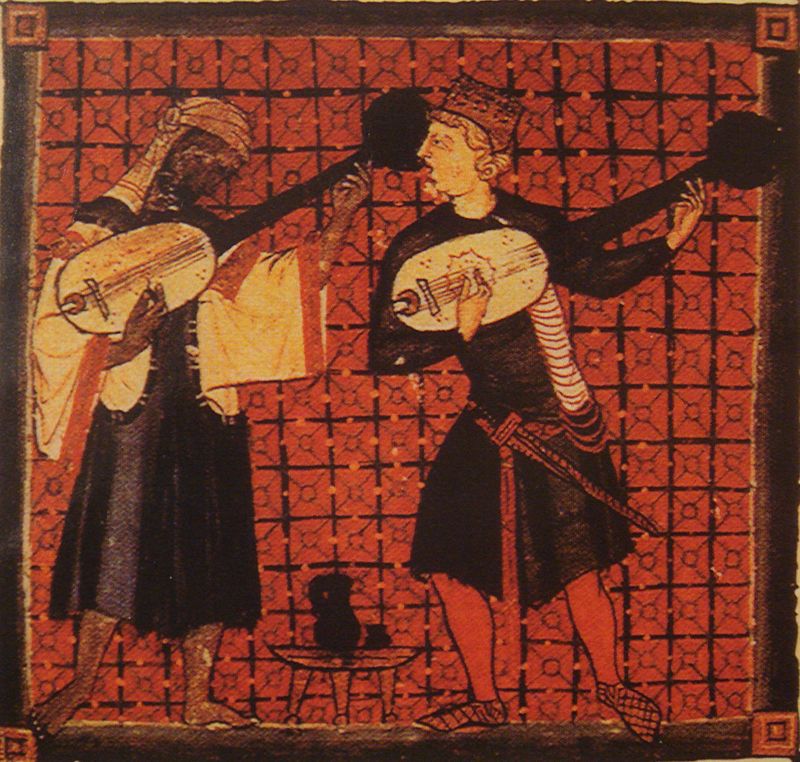
A Muslim and a Christian playing dueling banjos (13th century).
Mediæval Andalusia, or al-Andalus, was the region of Iberia under Muslim rule, its constantly shifting boundaries comprising, at their greatest extent, the entire territory of modern Spain and Portugal (plus a bit more), and at their smallest extent, just the area around Granada. (So, not quite the same territory as “Andalusia” today.)
This period, known for its many scientific and cultural achievements, has long been hailed as one in which (for much of the period, anyway) Muslims, Christians, and Jews were able to coexist and cooperate on peaceful and productive terms – an island of interfaith toleration and convivencia compared to the Christian kingdoms to the north and the more conservative Berber Muslim kingdoms to the south (both of which made repeated incursions into the region, bringing less tolerant policies with them).
Libertarians in particular will be familiar with Rose Wilder Lane’s enthusiastic endorsement of this thesis; and the beautiful 2007 documentary Cities of Light: The Rise and Fall of Islamic Spain defends the same viewpoint:
There’ve always been dissenters from this interpretation, of course, and in recent years they’ve grown increasingly vocal. This historical dispute is also very much entangled with contemporary politics; even though nothing about the present-day prospects for peaceful coexistence follows with anything like apodictic necessity from what people a millennium or so ago did or did not manage to achieve (especially given how much all the relevant cultures have changed since then), there’s nevertheless a tendency for those who are optimistic about the prospects for interfaith toleration today to point to al-Andalus as a positive model, while those who adopt a more belligerent clash-of-civilisations view tend to view al-Andalus in a negative light as well.
For those interested in getting an accurate understanding of the period, I recommend the following three books:
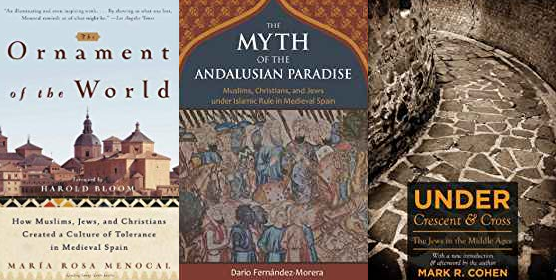
As you might guess from their titles, Menocal’s and Fernández-Morera’s books occupy opposing sides in this dispute; Menocal paints an especially rosy picture of the Andalusian convivencia, while Fernández-Morera takes the opposite line, arguing that al-Andalus was not only intolerant and oppressive, but much more intolerant and oppressive than Christian Europe. Cohen, for his part, takes a moderate view, opposing both the “myth of the interfaith utopia” and the “countermyth of Islamic persecution.” (Cohen’s book is both broader and narrower in focus than the other two – broader, in dealing with the Muslim world as a whole rather than just al-Andalus, and narrower, in dealing specifically with the treatment of Jews – but it nevertheless covers much of the same territory. And while the first edition of Cohen’s book came out before those of Menocal and Fernández-Morera, the most recent edition has an introduction specifically addressing their views. Oddly, Fernández-Morera cites Cohen’s work with high praise, as though they were in agreement, which they aren’t.)
I think one will get a juster picture from reading all three of these books than from reading just one. In my view, Menocal greatly exaggerates the virtues of the Andalusian regime, and Fernández-Morera greatly exaggerates its vices. But that makes them both useful if read with caution, because each makes points that serve as useful correctives to the other’s excesses. And then Cohen (whose interpretations seem to me to be generally the most reasonable) takes a more moderate position that serves as a check on both. (But Menocal and Fernández-Morera cover much material that Cohen doesn’t, so one can’t simply steer by Cohen alone.)
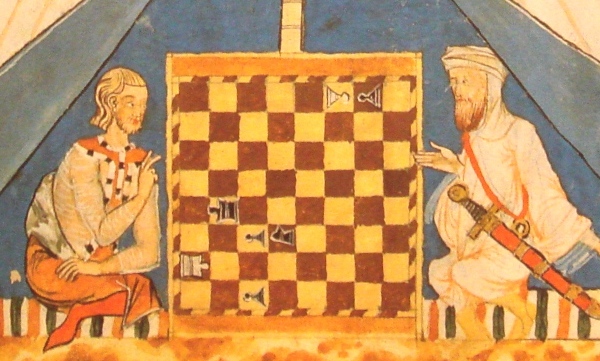
A Christian man and a Muslim man playing chess (13th century).
(While I’m no expert, it looks to me as though the Muslim is winning.)
Interestingly, if read carefully the three authors turn out hardly ever to disagree about the historical facts (despite Fernández-Morera’s pose as heroic exposer of the lies of academic orthodoxy); it’s much more a matter of selection and emphasis. There was, in fact, quite a bit of peaceful economic and intellectual cooperation between Muslims and non-Muslims in al-Andalus; there was also, in fact, quite a bit of oppression and persecution. Which aspect was dominant varied by time and region, as one might expect from a nearly 800-year history comprising multiple changing regimes. I find both Menocal and Fernández-Morera to be a bit slippery in this regard.
As an example of where Menocal is misleading: she downplays some of the worst cases of persecution, such as one series of executions in Córdoba in the 850s, concerning which she suggests that the victims – Christians who had denounced Muhammad as a false prophet – were essentially asking for it; Menocal chillingly dismisses them as “wild-eyed, out-of-control radicals” and “would-be martyrs” who “knew for a certainty that they were forcing the hands of the authorities of the city by expressly choosing to vilify Muhammad.” Here Fernández-Morera includes some details that Menocal conveniently omits:
The first one to die as a martyr was a well-educated monk named Perfectus. In 850 [he] encountered some Muslims he knew, who asked him to explain what Christians thought of Christ and the Prophet Muhammad. He told them that they might not like the answer. When they insisted, Perfectus made them promise not to tell his answer to anyone. He proceeded to cite a passage from the gospel in which Christ declares that “many false prophets will come in my name,” and Perfectus added that Christians believed Muhammad to be one of these false prophets. … Some days later, the same Muslims saw him in the city, pointed him out to the crowds, and accused him of having insulted the Prophet. The monk was arrested and locked in prison [and eventually] was publicly beheaded.
This does not sound like the story of someone seeking martyrdom.
Again, when Menocal speaks blithely of the role of “women who sang for a living, young and attractive entertainers much prized in the Andalusian courts,” Fernández-Morera reminds us that most of these women were in fact slaves, and indeed essentially sex-slaves.
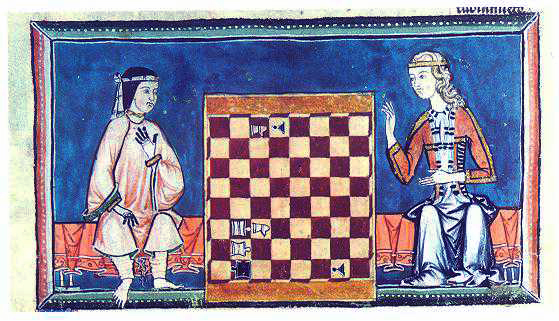
A Muslim woman and a Christian woman playing chess.
We’re in the end game now.
On the other hand, Fernández-Morera (who is incidentally a classical liberal of Austrian bent – gooble gobble, one of us!) for his part downplays the fact that these slave women of the Andalusian courts often fell, whether by sale or by conquest, into Christian hands, in the courts of the Andalusians’ northern neighbours – and their new Christian owners did not choose to free them. So as a special indictment of Muslim as opposed to Christian rule, the example falls short. (And certainly not all the women artists of Islamic courts were slaves.)
There is a still greater obstacle to Fernández-Morera’s suggestion that the Muslims were worse than the Christians in the area of religious oppression. He spends a lot of time talking about the burdensome restrictions placed on Christians by Muslim regimes, and fair enough; but he offers no comparable discussion of restrictions placed on Muslims by Christian regimes. As a matter of fact, during the subsequent period when Christian and Muslim kingdoms shared the Iberian peninsula – interacting sometimes as enemies on the battlefield, and sometimes as trading partners and military allies, depending on the pragmatic requirements of the situation – the status of Muslims under Christian rule was broadly similar to that of Christians under Muslim rule in the neighbouring Muslim states: a mixture of toleration and oppression, inclusion and exclusion, varying in details with time and place but not especially along interfaith lines. (For details, see Bryan Catlos’s books The Victors and the Vanquished: Christians and Muslims of Catalonia and Aragon, 1050-1300 and Muslims of Medieval Latin Christendom, c. 1050-1614.) But once the Iberian peninsula was fully in Christian hands again (with the completion of the Christian reconquista in 1492), and Christian kingdoms no longer had to come to terms with Muslim neighbours, Islam became illegal; in a series of edicts from Spanish and Portuguese rulers during the period 1492-1526, Muslims were forcibly required either to convert to Christianity or to be expelled from the realm. (A century later, Christians of Muslim ancestry – those who’d converted – were driven out anyway.) By contrast, when the Iberian peninsula was entirely in Muslim hands, no comparably universal and thoroughgoing persecution of Christians occurred. So if one wants to compare Muslim treatment of Christians with Christian treatment of Muslims, no number of examples of anti-Christian oppression is going to make the Muslims come out looking worse than the Christians’ complete ban on Islam once they recaptured Iberia.
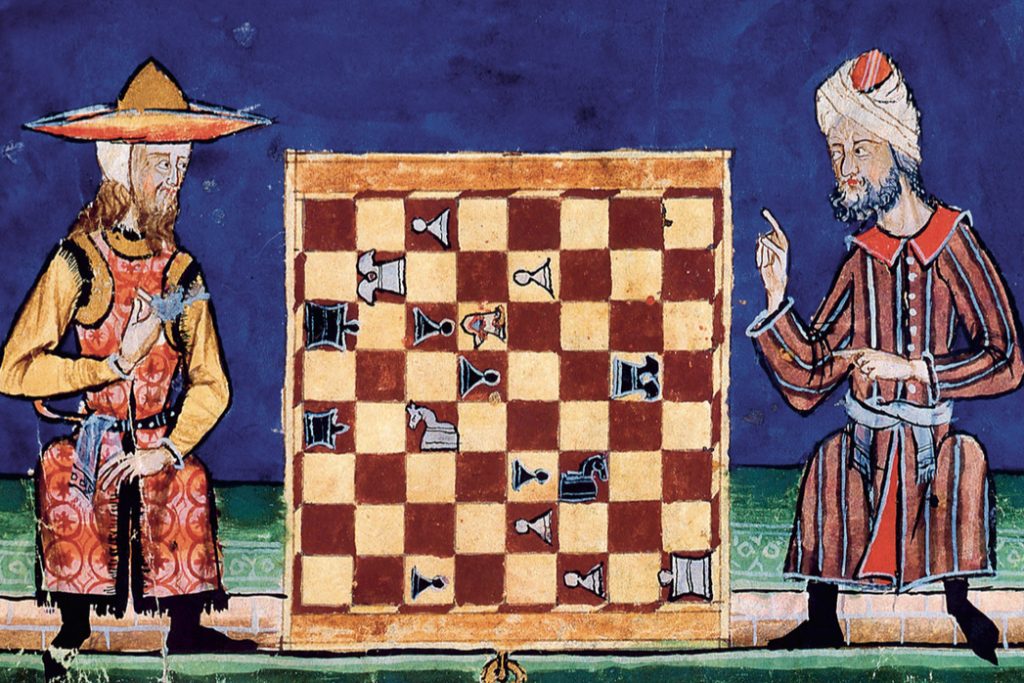
And a Jewish man and a Muslim man playing chess.
This game looks a bit harder to call than the first one.
Any comparative thesis with regard to religious oppression is thus going to have to turn instead on the treatment of Jews, a group relegated to second-class status by both Muslims and Christians – and here Cohen shows pretty convincingly that, in general, mediæval Islam was “more tolerant toward nonconforming minorities than Christianity” and that the contrary suggestion “ignores, one might say suppresses, the substantial security – at times verging on social (though not legal) parity – that Jews enjoyed through centuries of existence under Muslim rule.” (And of course when the Christians finally succeeded in driving all the Muslims out of Iberia, they drove all the Jews out along with them; many found refuge in the more tolerant Ottoman Empire.) Cohen’s explanation for Islam’s being more tolerant toward Jews than Christians were is that a religion founded by a merchant is naturally less prone to a certain traditional antisemitic prejudices. Another possibility I would point to is that mainstream Christianity’s distinctive theological doctrines (e.g., trinity and incarnation) render it more different from Islam and Judaism than the latter are from one another. (As for why Muslims tolerated Christians more than Christians tolerated Muslims, I’d assume this is related to the reason that Christians tolerated Jews at all, despite not tolerating Muslims: Christianity and Islam each tolerated the doctrines they regarded as forerunners of their own, but not doctrines that proposed to be their successors. Christianity and Islam each wanted to be the final revelation.)
There’s also a certain terminological slipperiness that both Menocal and Fernández-Morera seem to me to be guilty of. Words like “tolerance” and “toleration,” for example, carry a range of meanings, from grudging sufferance at one extreme (“I don’t like my cousin, but I tolerate him”) to the whole-hearted embrace of diversity and equal rights at the other extreme. Menocal will offer persuasive evidence for the existence of toleration in a weaker sense, and then follow it up with rhetoric appropriate to having shown the existence of toleration in a strong sense. Fernández-Morera, for his part, will offer persuasive evidence for the non-existence of toleration in a strong sense, and then follow it up with rhetoric appropriate to having shown the non-existence of toleration in a weaker sense. Thus the two authors manage to give completely opposite impressions, despite for the most part never literally contradicting each other. (Similar remarks apply to the term convivencia.)
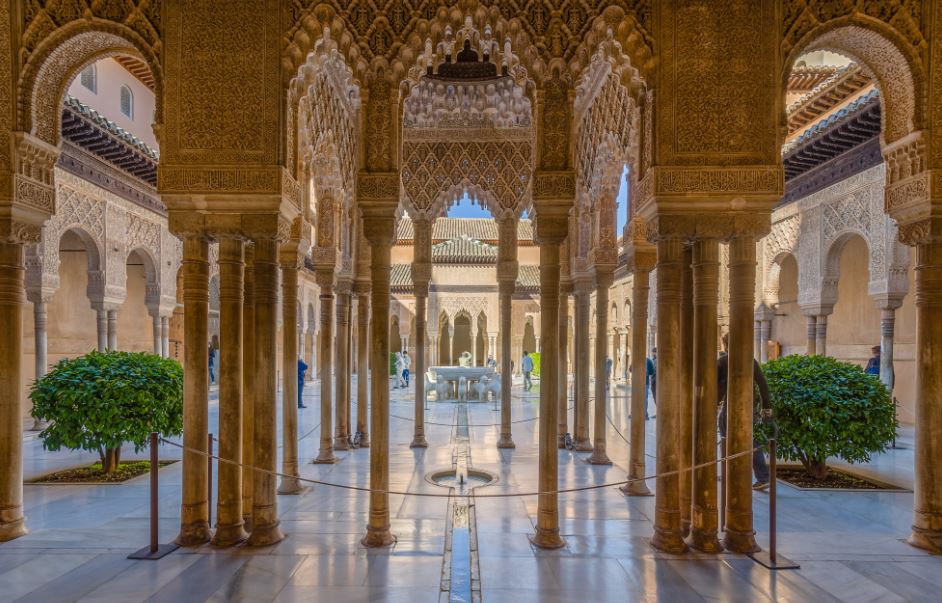
The usually more sober Cohen manages to trip himself up over terminology too. He tells us early on that his book is “not a comparative study of tolerance,” since “[n]either for Islam, nor for Christianity prior to modern times, did tolerance, at least as we in the West have understood it since John Locke, constitute a virtue.” In other words, it makes no sense to ask whether X is more or less tolerant than Y unless we are prepared to say that X and Y both meet some minimum liberal standard for tolerance. But is that really how these words work? Admittedly some terms do work that way; while I think Prague is more beautiful than Kraków, I would not express that by saying that Kraków is uglier than Prague, because that does ordinarily seem to imply that Kraków is ugly, full stop, which it certainly is not. On the other hand, if I say that a mouse is larger than a mosquito, that does not seem to imply that the mouse is large, full stop. It’s not obvious to me that “tolerant” works more like “ugly” than like “large.” In any case, in the rest of his book Cohen cheerfully forgets this opening stricture and speaks regularly of mediæval Muslim societies being more tolerant than their Christian counterparts.
Continuing the terminological theme: Fernández-Morera also seems to think that the common use of the term “Iberia,” rather than “Spain,” to refer to the Iberian peninsula during the Middle Ages, is a “politically correct” subterfuge to avoid offending Muslims (despite the fact that both the subtitle of Menocal’s book and the subtitle of the Cities of Light documentary unembarrassedly say “Spain”). I should have thought the more obvious motivation would be to avoid any confusion that might arise from the fact that “Spain,” today, is the name of a distinct nation-state that shares the Iberian peninsula with another nation-state, Portugal. (I’m leaving aside Andorra and Gibraltar as small enough to be ignored, as San Marino and Vatican City are in speaking of “Italy”; but Portugal is larger and more populous than, say, Austria.)
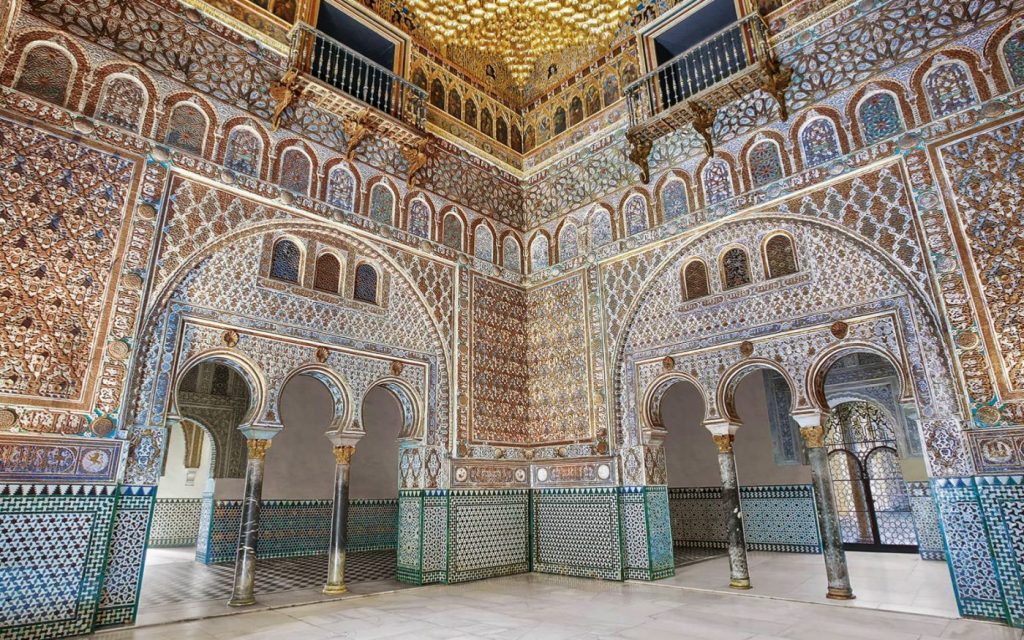
Another slipperiness I find in Fernández-Morera is this: As he notes, when Muslim regimes in al-Andalus pursued policies of (relative) tolerance, this was typically a decision of kings and princes, often opposed by clerics. But clerics, not kings and princes, Fernández-Morera says, are the true authorised spokesmen for Islam. Hence tolerant policies by Muslim princes do not count as establishing the tolerant character of the regime, because the real policies of any Islamic regime are those favoured by its clerics, not those favoured by its king – even in those cases where the clerics have no power to enforce their preferences, and the king is in a position to simply ignore the clerics. This seems a bit of a stretch – especially considering that in Islam there was no one institution with the authority to declare what was or was not Islamic, comparable to the power claimed (though not unchallenged either, FWIW) by the Catholic church. So it’s unclear why we should regard the clerics’ determinations as more “Islamic” than those of the kings. (Relatedly, Fernández-Morera tells us that “Muslims in al-Andalus lived under a …. hierocracy – a government of clerics”; but for Fernández-Morera this “government of clerics” remains in force even when the king’s decisions, in defiance of the clerics, are the ones that actually carry the day. Fernández-Morera’s clerics sometimes seem to savour a bit of Emperor Norton.)
All this doesn’t mean that Muslim rulers had enlightened and liberal motives for their more-tolerant policies. After all, under Islamic law Jews and Christians paid a tax from which Muslims were exempt, which could plausibly have had the economic effect of weakening any incentive, on the part of those collecting the tax, either to pressure Jews and Christians into conversion or to drive them out. Then again, on the other hand, those raised in a cosmopolitan court atmosphere might well have developed a genuine affinity, even if perhaps more an æsthetic than a moral one, for an atmosphere of diversity and intercultural exchange. In any case, whatever the reasons, Muslim regimes in al-Andalus did foster conditions for such exchange, even if not as thoroughly and consistently as in justice they should have, that their counterparts in Christian Europe did not.
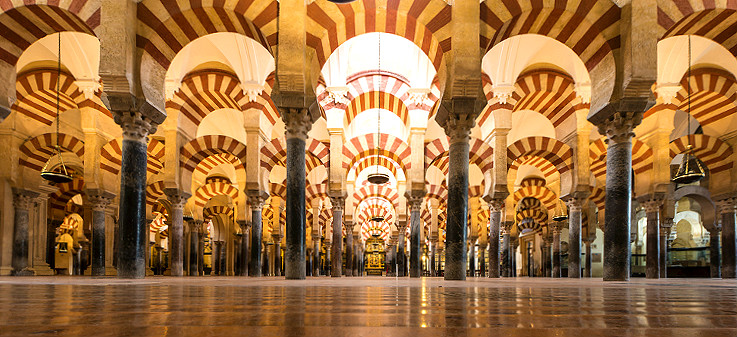
So my final verdict is, broadly, one cheer for Fernández-Morera, two cheers for Menocal, and three cheers for Cohen.


